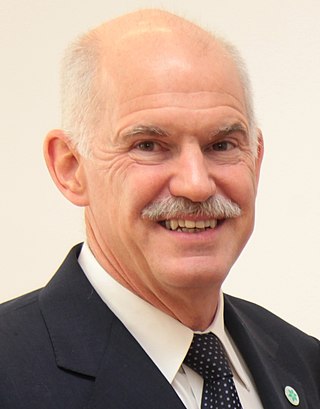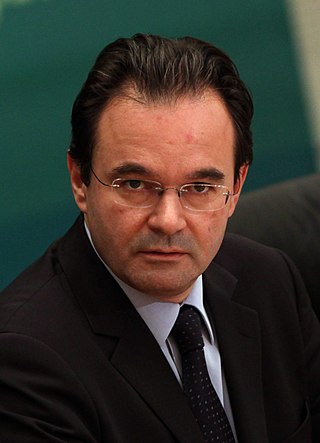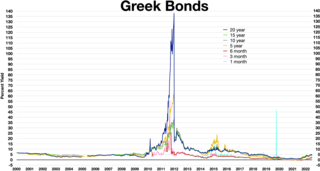This is a dynamic list and may never be able to satisfy particular standards for completeness. You can help by adding missing items with reliable sources.
This is a list of people associated with the eurozone crisis .
| This article is part of a series on |
 |
|---|
This is a list of people associated with the eurozone crisis .

George Andreas Papandreou is an American-born Greek politician who served as Prime Minister of Greece from 2009 to 2011. He is currently serving as an MP for Movement for Change.

Wolfgang Schäuble was a German politician whose political career spanned more than five decades. A member of the Christian Democratic Union (CDU), he was the longest-serving member of any democratic German parliament. Schäuble served as the 13th president of the Bundestag from 2017 to 2021.

Peer Steinbrück is a German politician who was the Chancellor-candidate of the Social Democratic Party (SPD) in the 2013 federal election. Steinbrück served as the eighth Minister-President of North Rhine-Westphalia from 2002 to 2005, a member of the Bundestag from 2009 to 2016, and as Federal Minister of Finance in the first Cabinet of Chancellor Angela Merkel from 2005 to 2009.

Lucas Demetrios Papademos is a Greek economist and academic who served as 12th Prime Minister of Greece from November 2011 to May 2012, leading a national unity government in the wake of the Greek debt crisis. A technocrat, he previously served as Vice-President of the European Central Bank from 2002 to 2010 and Governor of the Bank of Greece from 1994 to 2002.

The Eurogroup is the recognised collective term for the informal meetings of the finance ministers of the eurozone—those member states of the European Union (EU) which have adopted the euro as their official currency. The group has 20 members. It exercises political control over the currency and related aspects of the EU's monetary union such as the Stability and Growth Pact. The current president of the Eurogroup is Paschal Donohoe, the Minister for Public Expenditure, National Development Plan Delivery and Reform of Ireland.

Peter Altmaier is a German politician of the Christian Democratic Union (CDU) who served as Acting Minister of Finance from 2017 to 2018 and as Federal Minister for Economic Affairs and Energy from 2018 to 2021. He previously served as Federal Minister for the Environment, Nature Conservation and Nuclear Safety from May 2012 to December 2013 and Head of the German Chancellery and as Federal Minister for Special Affairs from December 2013 to March 2018. Altmaier is widely seen as one of Chancellor Angela Merkel's most trusted advisors and advocates for her more centrist wing of the CDU. He is known for his "compromising style" and was described in 2017 as "the most powerful man in Berlin".

Giorgos Papakonstantínou, is a Greek economist and politician and former Minister for the Environment, Energy and Climate Change of Greece and former Minister for Finance. Following expulsion from his party PASOK, he received a one-year suspended sentence for misdemeanours over his handling of the infamous “Lagarde list”. The court found him guilty of removing the names of three relatives of about 2,000 Greeks with money overseas. He is currently a professor at the European University Institute.

The European debt crisis, often also referred to as the eurozone crisis or the European sovereign debt crisis, was a multi-year debt crisis that took place in the European Union (EU) from 2009 until the mid to late 2010s. Several eurozone member states were unable to repay or refinance their government debt or to bail out over-indebted banks under their national supervision without the assistance of other eurozone countries, the European Central Bank (ECB), or the International Monetary Fund (IMF).

From late 2009, fears of a sovereign debt crisis in some European states developed, with the situation becoming particularly tense in early 2010. Greece was most acutely affected, but fellow Eurozone members Cyprus, Ireland, Italy, Portugal, and Spain were also significantly affected. In the EU, especially in countries where sovereign debt has increased sharply due to bank bailouts, a crisis of confidence has emerged with the widening of bond yield spreads and risk insurance on credit default swaps between these countries and other EU members, most importantly Germany.

Jeroen René Victor Anton Dijsselbloem is a Dutch politician and economist serving as Mayor of Eindhoven since 13 September 2022, succeeding John Jorritsma (VVD). A member of the Labour Party (PvdA), he has also been Chairman of the supervisory board of Wageningen University since 1 April 2019.

Jörg Asmussen is a German economist and politician who served as State Secretary of the Federal Ministry of Finance from 2008 to 2011 and Parliamentary State Secretary for the Federal Ministry of Labour and Social Affairs from 2014 to 2016. He has been serving as Chief Executive Officer of the German Insurance Association (GDV) since 2020.

Ioannis Georgiou "Yanis" Varoufakis is a Greek economist and politician. Since 2018, he has been Secretary-General of Democracy in Europe Movement 2025 (DiEM25), a left-wing pan-European political party he co-founded in 2016. Previously, he was a member of Syriza and was Greece's Minister of Finance between January 2015 and July 2015, negotiating on behalf of the Greek government during the 2009-2018 Greek government-debt crisis.
A referendum to decide whether or not Greece was to accept the conditions under which the European Union (EU), the International Monetary Fund (IMF) and the European Central Bank (ECB) would allow a 50% haircut of Greek debt owed to private creditors was planned to be held in 2011. However, Prime Minister George Papandreou decided to cancel the referendum on 3 November, if the opposition parties vote in favour of the EU deal. The proposed referendum was later cancelled.

European debt crisis contagion refers to the possible spread of the ongoing European sovereign-debt crisis to other Eurozone countries. This could make it difficult or impossible for more countries to repay or re-finance their government debt without the assistance of third parties. By 2012 the debt crisis forced 5 out of 17 Eurozone countries to seek help from other nations. Some believed that negative effects could spread further possibly forcing one or more countries into default.

The European debt crisis, often also referred to as the eurozone crisis or the European sovereign debt crisis, was a multi-year debt crisis that took place in the European Union (EU) from 2009 until the mid to late 2010s that made it difficult or impossible for some countries in the euro area to repay or refinance their government debt without the assistance of third parties.

The European debt crisis, often also referred to as the eurozone crisis or the European sovereign debt crisis, was a multi-year debt crisis that took place in the European Union (EU) from 2009 until the mid to late 2010s. Several eurozone member states were unable to repay or refinance their government debt or to bail out over-indebted banks under their national supervision without the assistance of other eurozone countries, the European Central Bank (ECB), or the International Monetary Fund (IMF).

The eurozone crisis, also known as the European sovereign-debt crisis, was a financial crisis that made it difficult or impossible for some countries in the euro area to repay or re-finance their government debt.

The proposed long-term solutions for the Eurozone crisis address ways to deal with the European debt crisis that took place in the European Union from 2009 till the late 2010s, including risks to Eurozone country governments and the Euro.

The Greek government-debt crisis began in 2009 and, as of November 2017, was still ongoing. During this period, many changes had occurred in Greece. The income of many Greeks has declined, levels of unemployment have increased, elections and resignations of politicians have altered the country's political landscape radically, the Greek parliament has passed many austerity bills, and protests have become common sights throughout the country.